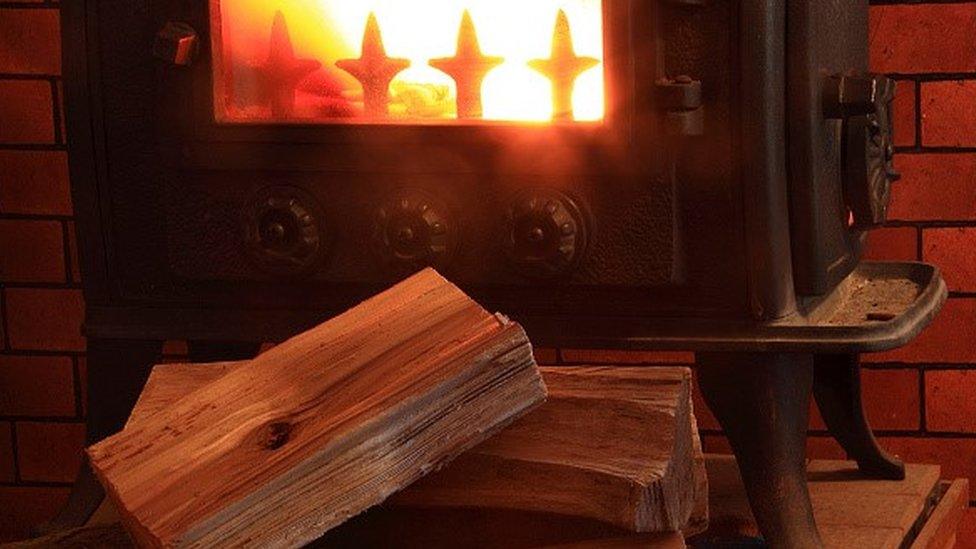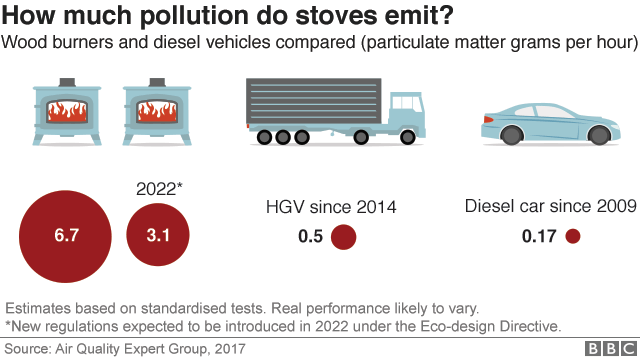Air pollution plans to tackle wood burners
- Published

Plans to tackle sources of air pollution - such as wood-burning stoves - put too much responsibility on local councils, critics say.
The government, as part of its clean air strategy, wants to clamp down on all sources of pollution, including coal-burning and ammonia from farms.
Campaigners welcome the consultation, but say it does not go far enough.
Environment Secretary Michael Gove said it would be "disproportionate" to have a uniform ban on certain fuels.
He said the air pollution effects in rural areas of fuels, such as diesel or coal, are significantly less compared to urban areas as they are dispersed.
He told BBC Radio 4's Today Programme: "What we've got here are a series of proportionate measures which we hope will deal with what is a big public health issue."
Ministers want to halve the number of people exposed to high levels of pollution from fine particles, known as particulates, by 2025.
One of the most contentious proposals is to reduce pollution from wood burners, which, along with solid fuels, cause 38% of particulate pollution.
But a source at the Department for Environment, Food and Rural Affairs (Defra) told the BBC there was no plan to ban existing stoves - or the burning of coal and open wood fires, which are far more polluting than wood burners.
If you cannot view the postcode search, please click here, external to reload the page.
Farmers, who have largely evaded pollution controls so far, will be told to buy new equipment to reduce airborne ammonia from slurry.
The government has been obliged to publish this Clean Air Strategy under an EU rule. It's in addition to the law which has seen the UK taken to court over high levels of nitrogen dioxide pollution.

What about my wood burner?
The new legislation would not ban existing wood-burning stoves. However, any new stoves that are sold would have to be cleaner
People would be encouraged to burn dry seasoned wood, which emits fewer particulates than wet wood
Councils would be given new powers, such as limiting what people can burn or introducing "no-burn days"
But there is not expected to be a ban on the sale of wet wood, which typically come from garage forecourts

Ministers estimate that their plans will reduce the costs of air pollution to society by an estimated £1 billion every year by 2020, rising to £2.5 billion every year from 2030.
They describe air pollution as the fourth biggest threat to public health after cancer, obesity and heart disease.
New powers
Environment Secretary Michael Gove said: "Air quality has improved significantly since 2010 but 60 years on from the historic Clean Air Act a clear truth remains - air pollution is making people ill, shortening lives and damaging our economy and environment.
"This clean air strategy sets out the comprehensive action required across all parts of the government to improve air quality."
All EU nations will have to submit similar plans to cut pollution but Mr Gove says the UK's policies will be carried out beyond Brexit.
Michael Gove told Today "conventional cars" will be banned by 2040
The legislation will give new powers to local councils so they can solve pollution hotspots. Some councils welcome this approach whilst others think they're being left to do the government's dirty work.
Martin Tett, from the Local Government Association said: "If we're to truly tackle air pollution, we need government support to enable us to deliver effective local plans, and robust national action to help the country transition to low-emission vehicles and power generation."
'Lacking detail'
Green groups are pleased that the plan will be embedded in new primary legislation - and they applaud the decision to halve the number of people exposed to high levels of particulates.
But they say the document so far doesn't say how the government will deal with the on-going problem of NOX emissions from cars. And they accuse it of loading too much work on to local councils.
Doug Parr from Greenpeace told BBC News: "The ambition is impressive - but how is it going to be achieved? Lots of councils simply don't have the resources to deal with these issues."

He said the proposal on wood burners was far too vague: "Will hard-pressed environmental health officers really be checking on wet wood in forecourts?" he asked.
Sue Hayman MP, Labour's Shadow Environment Secretary, said: "Michael Gove has become the Secretary of State for Consultations - with over 25 consultations published by his department since the General Election and not a single piece of primary legislation brought forward."
Farmers will be supported to cut ammonia emissions through the proposed new farming funding system known as public money for public goods.
One technologically-difficult issue is also acknowledged - the contribution to microplastic air pollution and water pollution from vehicle brakes and tyres wearing on the road. The government says it will work with international partners to research and develop new standards.
Follow Roger on Twitter., external

Do you have any questions about tackling air pollution? Send us your questions and a BBC journalist will investigate the most popular.
Use this form to ask your question:
If you are reading this page on the BBC News app, you will need to visit the mobile version of the BBC website to submit your question on this topic.